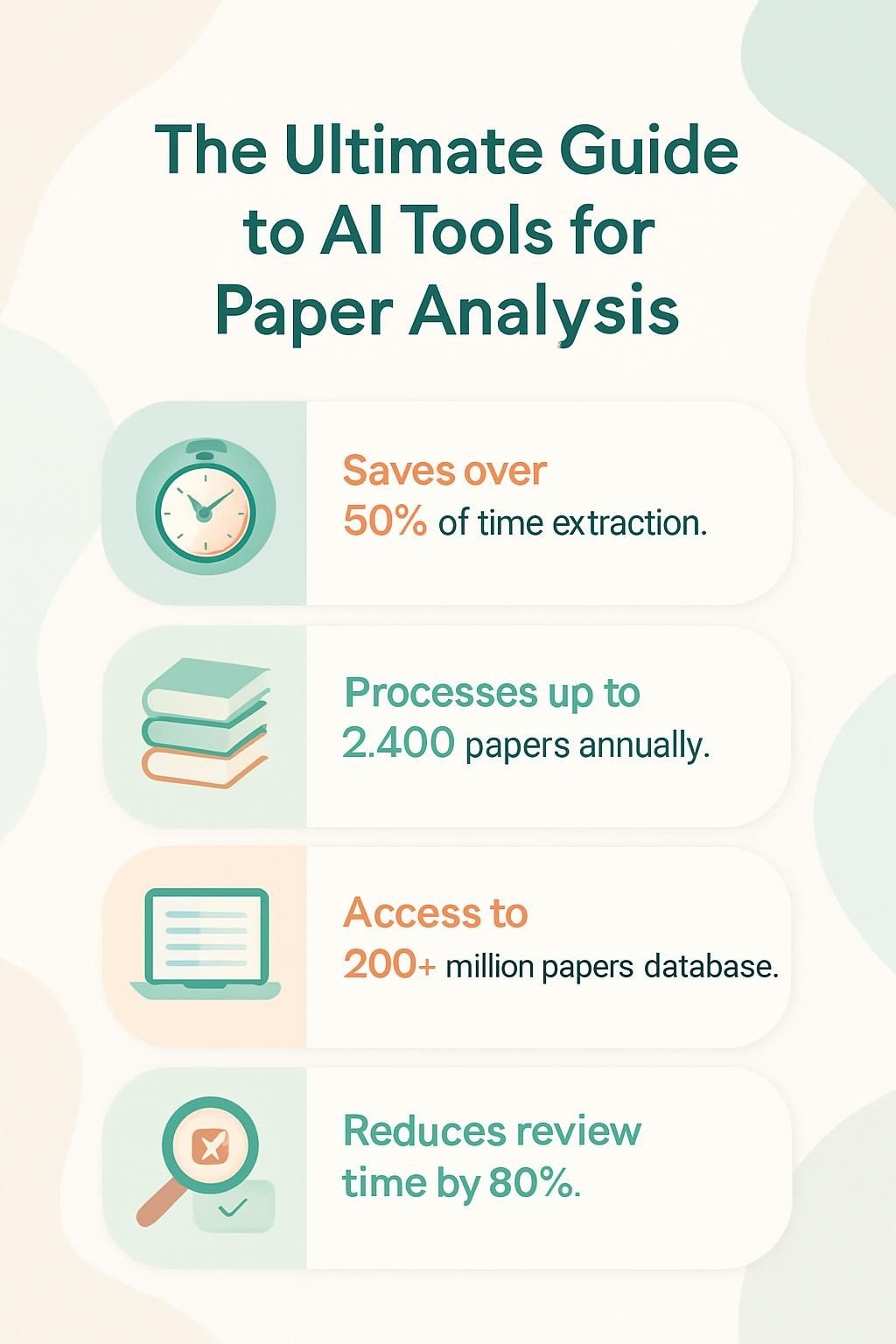Struggling to analyze research papers fast and accurately? AI tools for paper analysis can save you time with smart features like summarization and data extraction. This guide will show you how these tools work and which ones are best for your research needs.
Keep reading—you don’t want to miss this!
Key Takeaways
- AI tools like Elicit and Consensus save over 50% of time in data extraction and reduce systematic review time by 80%. They provide automated summarization and citation tracking.
- Elicit processes up to 2,400 papers annually with its Pro Plan for $42/month. It uses large language models to summarize research findings clearly.
- Consensus offers access to a database of over 200 million papers. Its features include study snapshots, Pro Analysis, and the Consensus Meter for precise insights.
- These tools help researchers analyze complex topics like biomedicine or machine learning effectively, offering evidence-based summaries fast.
- Choose based on your needs—Elicit works well for extracting specific data; Consensus is great for filtering studies by design or methodology.

Key Features of AI Tools for Paper Analysis
AI tools simplify complex research tasks and save time. They offer smart insights that help you understand papers better.
Automated data extraction and analysis
AI tools extract data from hundreds of research papers in minutes. This process saves over 50% of the time and cost compared to manual methods. Systematic reviews become faster, reducing review time by 80%.
Tools like Elicit automate search, screening, and extraction, making tasks easier for researchers.
Machine learning allows these tools to sort through PDFs and find key information. They help identify evidence-based insights quickly. Researchers can focus on trending topics or systematic literature reviews without getting lost in irrelevant data.
Transparent screening and citation tracking
Automated processes don’t stop at data extraction. Transparent screening provides clear criteria for research selection with a single click. It traces references back to original studies and ensures accuracy in your literature review.
This feature helps follow citations directly to their source, saving time in searching through long reference lists. Elicit includes direct quotes from papers, which can add depth to your qualitative research or experiments.
Sources are always provided, so users can verify details easily without guessing.
Elicit Reports include direct quotes from original research papers.
Summarization and contextual insights
AI tools quickly summarize research findings from top papers. These tools highlight critical data and evidence-based insights, saving you time. Users can explore key topics using large language models or semantic engines like Elicit and Consensus.
They also offer source quotes for each summary. This helps ensure transparency and accuracy in your literature review or research papers. By identifying important studies, these tools make unfamiliar fields easier to understand fast.
Top AI Tools for Paper Analysis
AI tools can make paper analysis faster and smarter. They help researchers find insights and track key information with ease.
Elicit: AI Research Assistant
Elicit helps over 2 million researchers simplify paper analysis. It uses large language models (LLMs) to extract and summarize data from research papers quickly. The Basic Plan allows users to process 20 papers each month, while the Pro Plan supports up to 2,400 annually.
This tool tracks citations, extracts evidence-based insights, and provides clear summaries of complex studies like placebo-controlled trials or cardiovascular health reports. Released in *Nature* on April 7, 2025, Elicit is designed for professional researchers needing clear results and editable reports.
Consensus: AI-powered Academic Search Engine
Consensus is an AI-based academic search engine with a database of over 200 million research papers. It helps users find evidence-based insights quickly. Its Pro Analysis and Consensus Meter tools provide clear summaries of research findings.
Users can filter studies by sample size, study design, or methodology for precise results.
Over 5,000 institutions trust this tool worldwide. More than 2 million researchers, students, and professionals use it regularly. Features like study snapshots make complex data analysis simple and accessible.
It also provides paper-level insights to streamline literature reviews.
How AI Tools Can Improve Your Research Papers
AI tools speed up literature reviews by automating data extraction. They reduce costs and time by 50% for systematic reviews and meta-analyses. These tools help researchers find papers that traditional searches miss, saving hours of work.
Smart algorithms also provide evidence-based insights across topics like biomedicine or machine learning.
Generative AI simplifies complex ideas into clear summaries. Tools like Elicit or Consensus deliver contextual information, helping users understand new domains quickly. For example, they analyze heart rate variability research or human-computer interaction studies with ease.
This lets you focus more on refining your arguments and less on tedious tasks.
How to Choose the Right AI Tool for Paper Analysis
Pick an AI tool that matches your research style and helps analyze papers with ease—click to learn how.
Identify your specific research needs
Define your research topic clearly. Focus on what you need—analyzing evidence, tracking citations, or summarizing data. For example, if exploring machine learning trends, prioritize tools like Elicit or Consensus that cover large databases (125–200 million papers).
Choose a tool that supports your field. Biomedicine researchers may benefit from citation-tracking features or systematic review automation. Tools offering these can save time and improve accuracy in finding relevant research papers.
Move forward by comparing AI tools’ features and costs to fit your needs better!
Evaluate features and pricing options
Elicit and Consensus both bring useful features for paper analysis. Elicit offers automated data extraction. The Basic Plan is free but limited to 20 papers each month. For more access, the Plus Plan costs $10/month (billed yearly) and handles up to 600 papers a year.
Need even more? The Pro Plan at $42/month extracts data from 2,400 papers annually.
Consensus includes tools like Pro Analysis and a Consensus Meter for detailed insights. Compare plans based on your research needs. Consider how many papers you analyze monthly before choosing a plan.
These AI research tools provide evidence-based insights at different pricing levels, helping you manage your work efficiently without overpaying!
Conclusion
AI tools for paper analysis can save time and boost your research. Tools like Elicit and Consensus simplify complex tasks like data extraction, screening, and summarization. They give quick insights from millions of papers with ease.
Choose the right tool based on your needs and budget to make the most of these smart technologies. Start exploring today!
Discover more about enhancing your academic writing by exploring our guide on how AI tools can improve your research papers.


Leave a Reply